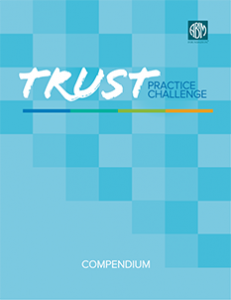- Medical Professionalism
- The Physician Charter
- Building Trust
- Health Equity & Inclusion
- Choosing Wisely®
- Grants
- ABIM Foundation Forum
- 2025 Reimagining Professionalism: Hope in a Shifting Medical Landscape
- 2024 Being a Trustworthy Professional in an Untrusting World
- 2023 Reframing Trust – A Path to Address Misinformation
- 2022 Fact or Fiction – Strategies for the Misinformation Age
- 2021 Pursuing Trust – Striving for Equitable Health Care
- 2020 Building Trust & Health Equity
- 2019 [Re]Building Trust – A Path Forward
- 2018 [Re]Building Trust
Trust Practice Challenge
In May 2019, the ABIM Foundation announced the winners of the inaugural Trust Practice Challenge, an initiative to identify and promote existing practices that have helped build or rebuild trust in various aspects of the health care system, with the goal of creating a compendium of replicable and scalable measures.
The winning organizations and their projects included:
- Duke University School of Medicine’s Department of Medicine invites Duke Health providers, staff, students, trainees, patients and visitors to have one-on-one conversations about what is meaningful in their lives, work and relationships through facilitated discussion in a listening booth through its “Voices of Duke Health” initiative.
- Hawai’i Pacific Health’s “Getting Rid of Stupid Stuff” program invites clinical staff who use its electronic health record system to identify documentation and other practice requirements that should be eliminated, changed or modified.
- The Colleges Advisory Program at Johns Hopkins School of Medicine is an appreciative advising framework that models leadership and communication skills necessary for positive mentoring relationship between students and faculty.
- The Leader Index at Mayo Clinic evaluates five key leader behaviors based on a 12-question staff-wide survey.
- The Relational Leadership Institute at Oregon Health and Science University is a three-month leadership learning collaborative that emphasizes emotional intelligence, strength-based engagement with others, and cultivation of trust and psychological safety on teams.
- Unity Point Clinic’s Prairie Parkway LGBTQ Clinic provides comprehensive care for the communities it serves.
- The University of Chicago Medicine developed a comic strip to foster better patient engagement involving electronic health record (EHR) systems based on published studies and systematic reviews on the impact of technology use on the patient-provider relationship and communication.
- Wisconsin Collaborative for Healthcare Quality is a voluntary consortium formed by nine health system leaders, in partnership with the business community, who believed data collection, transparency, and collaboration had the power to transform practice and improve the quality of patient care.



